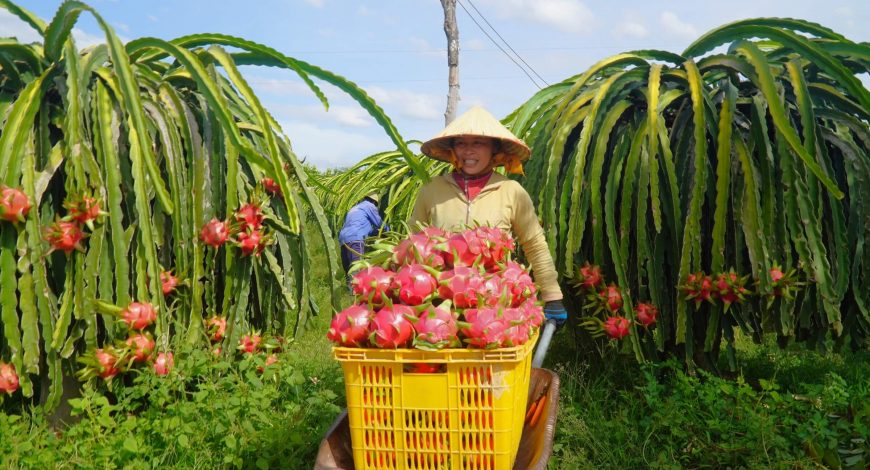The export of Vietnamese agricultural products to the Chinese market faces many difficulties, but this is a land of great potential.
According to statistics of the Ministry of Agriculture and Rural Development, so far, only 8 kinds of fresh fruit of Vietnam have been officially exported to the Chinese market. The above fruits include: dragon fruit, banana, rambutan, longan, litchi, mango, watermelon and jackfruit. At the end of April 2019, China granted an import license for Vietnam's mangosteen. This is the 9th fruit to be officially exported to this market.
At the conference "Development of agricultural and fishery exports to the Chinese market" held in Hanoi in early September, Minister of Industry and Trade Tran Tuan Anh said: "The export of agricultural and aquatic products to China still exists. many difficulties because our business practices are still based on unprofessional factors. We mainly rely on cross-border trade (small quota), based on border gate clearance points, but have not brought goods deep into China's interior. Therefore, agricultural and aquatic products have not met technical barriers, have not formed a sustainable production and consumption chain, and created added value.
Minister Tran Tuan Anh affirmed that difficulties in exporting to China have existed for many years and ministries, sectors and businesses have also made great efforts to solve.
At this time, China will increasingly set up barriers, high and strict requirements, related to product quality, food safety, traceability, branding... Therefore, the Minister Industry and Trade wishes to quickly implement specific solutions to increase export growth, create a stable market for the agricultural industry, and step by step solve the long-standing story of "good harvest, devaluation" of agricultural products.
“The Ministry of Industry and Trade, the Ministry of Agriculture and Rural Development and other ministries, agencies, associations, businesses and localities will coordinate, discuss and clarify more closely, from reports to practices to compare. policies, clarifying relevant requirements, thereby building a sustainable import-export strategy", emphasized Minister Tran Tuan Anh.
Need to improve competitiveness and open the market
Also at the conference, Minister of Agriculture and Rural Development Nguyen Xuan Cuong said that in the coming years, without improving competitiveness, it will be difficult for Vietnamese agricultural products to penetrate the markets of rural areas. China's development sector due to its similarity and competitiveness. Export and import, if not controlled and managed well, following immediate benefits, will risk environmental degradation, depletion of natural resources, biodiversity, and importation of products into our country. products and goods that are not friendly to the environment and human health.
According to Minister Nguyen Xuan Cuong: “What needs to be done now is to actively negotiate to open the market. Because border exports to China have been gradually restricted, while the country is increasingly raising technical barriers on plant quarantine.
On the business side, the Minister of Agriculture and Rural Development said that export businesses need to actively and actively seek partners and promote products through participation in fairs and exhibitions. . Improve capacity and awareness in understanding the technical regulations and quarantine requirements of the Chinese market.
“Businesses need to change from final food safety inspection to monitoring all stages of the entire production chain, while raising awareness of safer and quality products. Establish a cooperation mechanism between managers - enterprises - manufacturers to ensure safety in the entire supply chain," said Minister Nguyen Xuan Cuong.
Note when exporting agricultural products to China
At the conference, Minister Nguyen Xuan Cuong also made some notes for enterprises exporting Vietnamese fruits to China.
Firstly, with fruits exported a lot to China such as watermelons, it is possible to use stamps with traceability codes on melons or pack melons with carton packaging with traceability information.
Second, exporters also need to actively choose to use carton packaging or stickers on fruits; actively choose a unit that prints traceability labels. Currently, there are 41 export enterprises that have signed contracts with Trung Kiem Group (CCIC), which is capable of supplying large quantities of labels for businesses.
The third point is that from May 1, 2019, China Customs has implemented a number of new regulations for a number of fruits imported from Vietnam, which businesses need to pay attention to:
For watermelons: Straw-lined watermelons are not allowed to clear customs; Requires the use of foam mesh or a pest-free material to wrap the fruit.
For jackfruit: it is required to use tough Kraft paper to wrap or use carton packaging with traceability information printed.
For bananas: the packaging is required to be a carton or a plastic bag for wrapping (both codes and traceability information must be printed); for lychee: must be packed in styrofoam boxes with imprinted stamps.
An Nguyen









